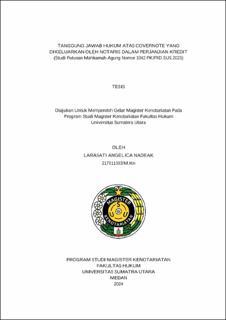| dc.description.abstract | Covernotes are critical instruments in credit transactions issued by notaries as temporary assurances pending the completion of required legal documents. However, the practice of issuing covernotes by notaries has raised various legal issues. This study aims to examine the obligations of notaries to ensure the accuracy of data submitted by clients before drafting a covernote in credit agreements, the notary's liability for covernotes issued concerning problematic loan disbursements at banks, and a legal analysis of judicial decisions regarding covernotes issued by notaries in relation to credit agreements under Supreme Court Decision No. 1042 PK/Pid.Sus/2023.
This study employs a normative juridical research method with a descriptive- analytical approach. Secondary data were utilized, collected through literature studies and interviews, and subsequently analyzed qualitatively.
The analysis of the obligations and liabilities of notaries related to covernotes in credit agreements, as well as Supreme Court Decision No. 1042 PK/Pid.Sus/2023, concludes that notaries have a fundamental duty to verify client data as stipulated in Article 16(1) of the Notary Law (UUJN) by examining documents, checking with the Land Agency (BPN), and explaining legal risks to the parties. Violations of these duties may result in notaries' civil liability under Articles 1365, 1366, and 1320 of the Civil Code for compensation, administrative sanctions under Article 85 of the UUJN for breaches of Articles 16(1)(a) and 17(1)(i) of the UUJN, and criminal liability under Articles 263 and 264 of the Criminal Code for forgery in office. In the case of Notary Gemara Handawuri, while the ruling applied the Corruption Eradication Law (UU Tipikor), the act of issuing a covernote without proper verification aligns more closely with the elements of document forgery, as the core offense involved creating a document with false content in the capacity of a public official. The state loss was merely a consequential effect rather than the primary intent of the act. | en_US |


